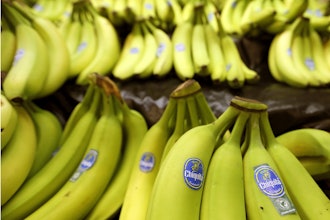
PORTLAND, Maine (AP) — It's been a slow lobster season so far in Maine, but the lack of crustaceans isn't translating into high prices for consumers, and fishermen are still hopeful for a bump in catch this summer.
The harvest of the valuable bottom dwellers in America's biggest lobstering state is usually in full swing by July, but fishermen say they haven't caught much this month. The season tends to pick up after many lobsters shed their shells and reach legal size, and that hasn't happened yet, fishermen said.
The slow season hasn't caused prices to budge: Consumers are paying about the same for live lobsters as at this time last year, when the crustacean catch was more plentiful earlier in the season. Wholesale prices are also slightly behind where they were a year ago. Lobsters are still readily available to consumers, and numerous factors impact the prices they pay, including international demand and the size of the harvest elsewhere.
The season so far is similar to the lobster hauls veteran fishermen saw in the 1980s and '90s, when the boom in catch typically came later, said Steve Train, a lobsterman based in Long Island, Maine. It's frustrating for those who are used to the big, early catches of the modern era, he said.
"We've got a whole generation where they're used to making money by now. And those of us who have seen it don't like it," Train said. "Anything is possible, but it's hard to make up six weeks of income."
One reason for the slow start could be the long, cold spring. Warm weather tends to bring an early shed and thus higher catches, but that has not been the case this year. The cooler year is happening amid a long-term trend in the Gulf of Maine of warming.
This year's slow start also means an expected bait shortage hasn't caused much worry. Federal regulators are reducing the amount of herring that fishermen are allowed to catch. That could make it more difficult — and more expensive — for fishermen to load traps.
The slow start has allowed fishermen to hold on to resources until it makes sense to use them, said Patrice McCarron, executive director of the Maine Lobstermen's Association.
"Guys have been able to come into the fishery slow, save bait resources, fuel resources for what they're really going to need it," McCarron said.
Maine typically accounts for about 80% of the nationwide lobster haul. Catches this decade have been much higher than any other long stretches in the state's history. The haul peaked at 132.6 million pounds (60.2 million kilograms) in 2016 and nearly topped 120 million pounds (54 million kilograms) last year.
The wholesale price for a 1¼-pound lobster was $7.33 as of July 1, according to business publishing company Urner Barry. That's 62 cents less than it was a year ago on the same date. Retail consumers are paying about $9 per pound at Maine seafood counters.
Alex Todd, a lobsterman who operates out of Chebeague Island, said he hasn't hauled too many traps yet, but he's not worried.
"We've been right here before and still had a great season," he said.





















